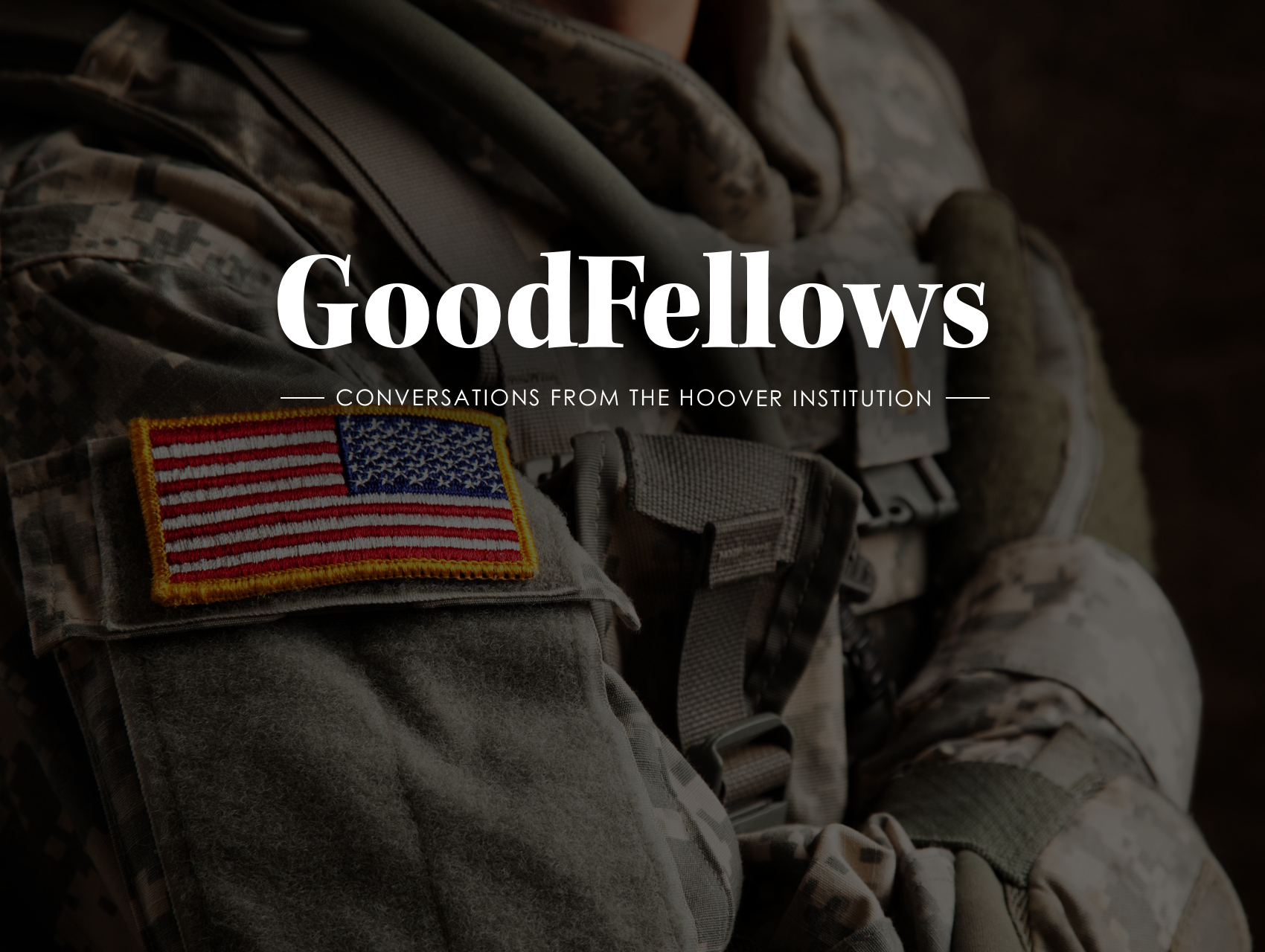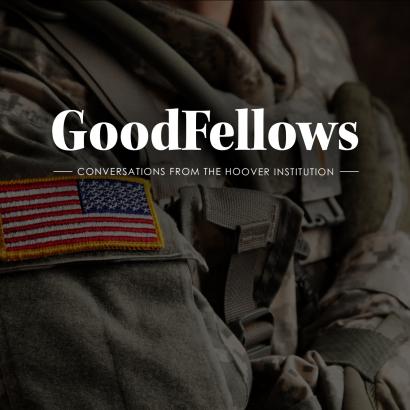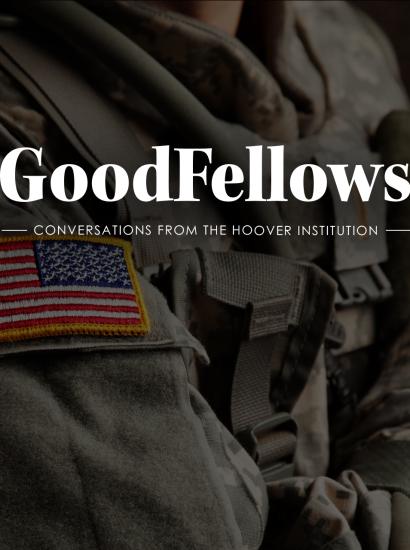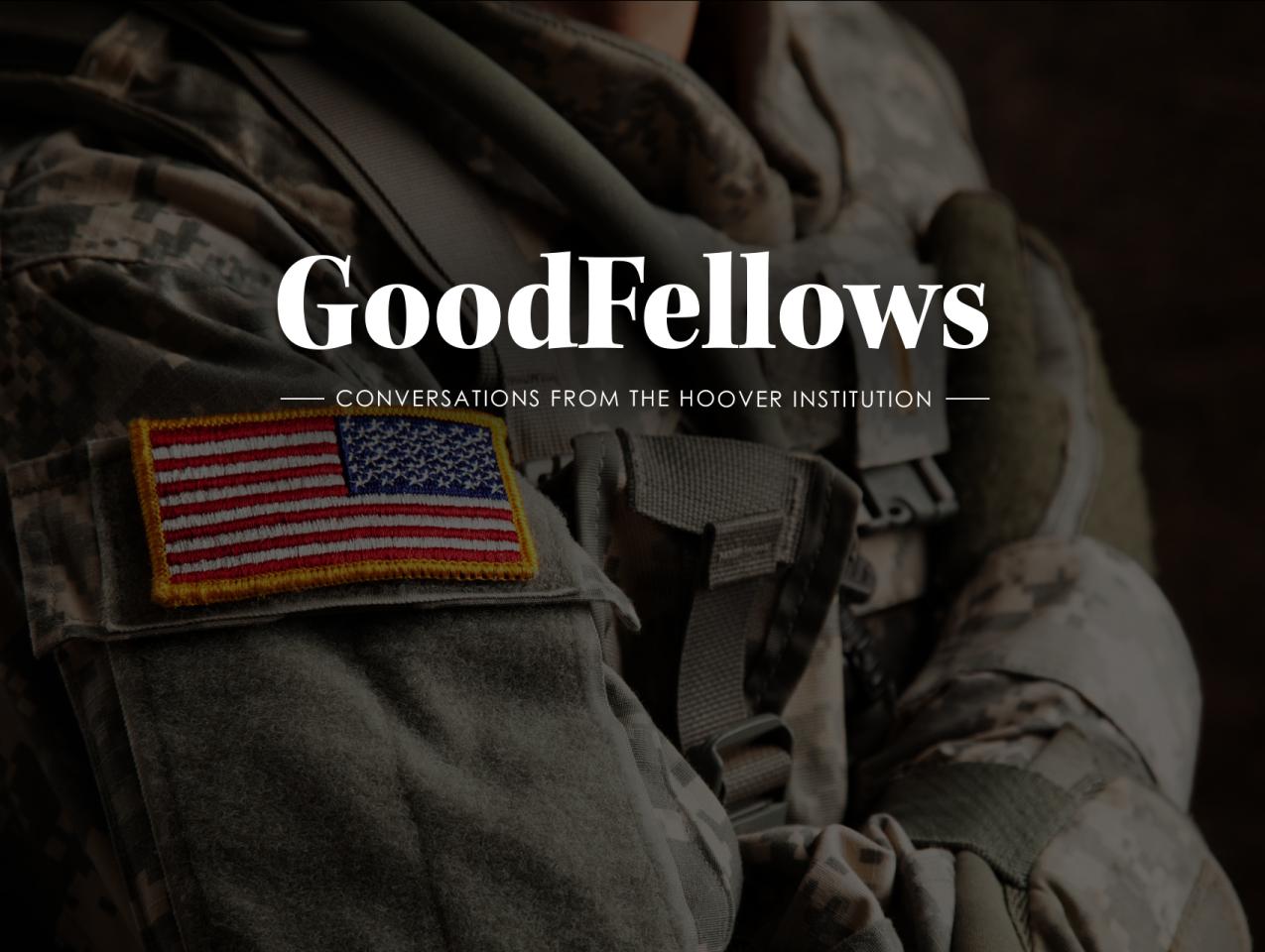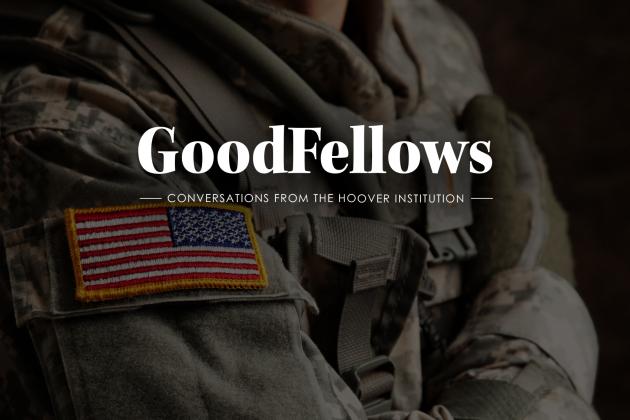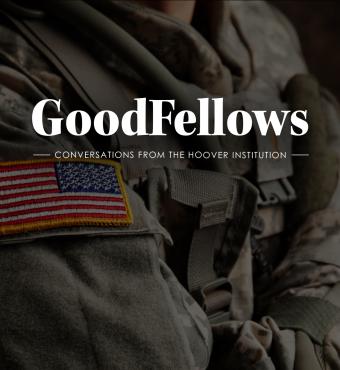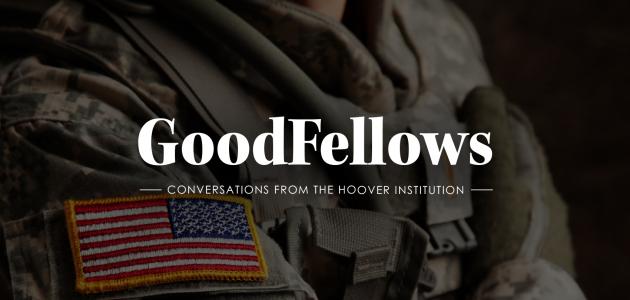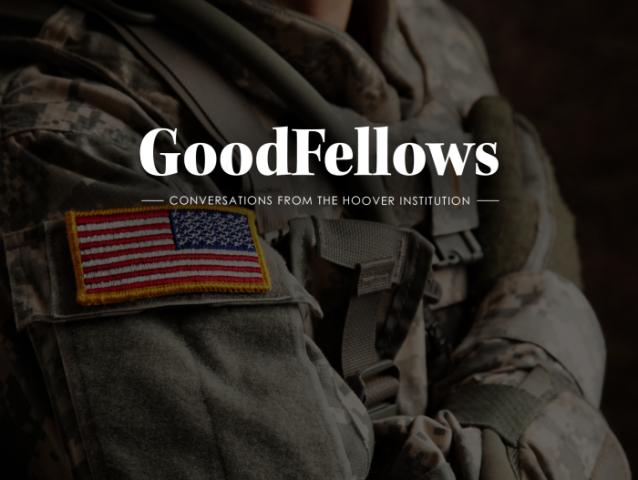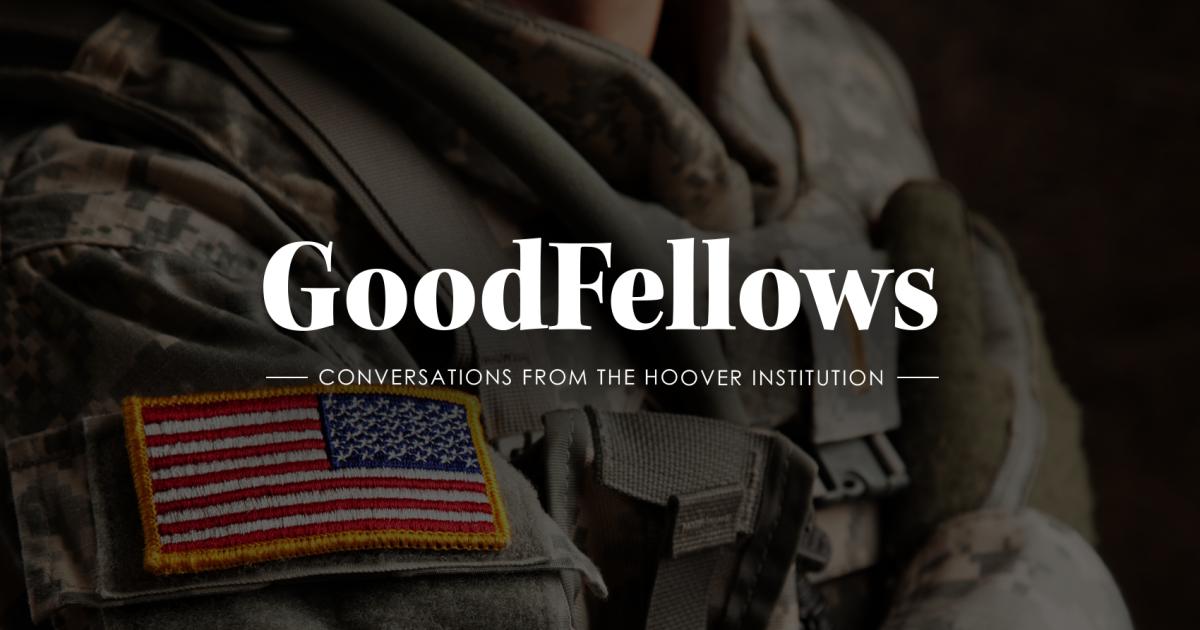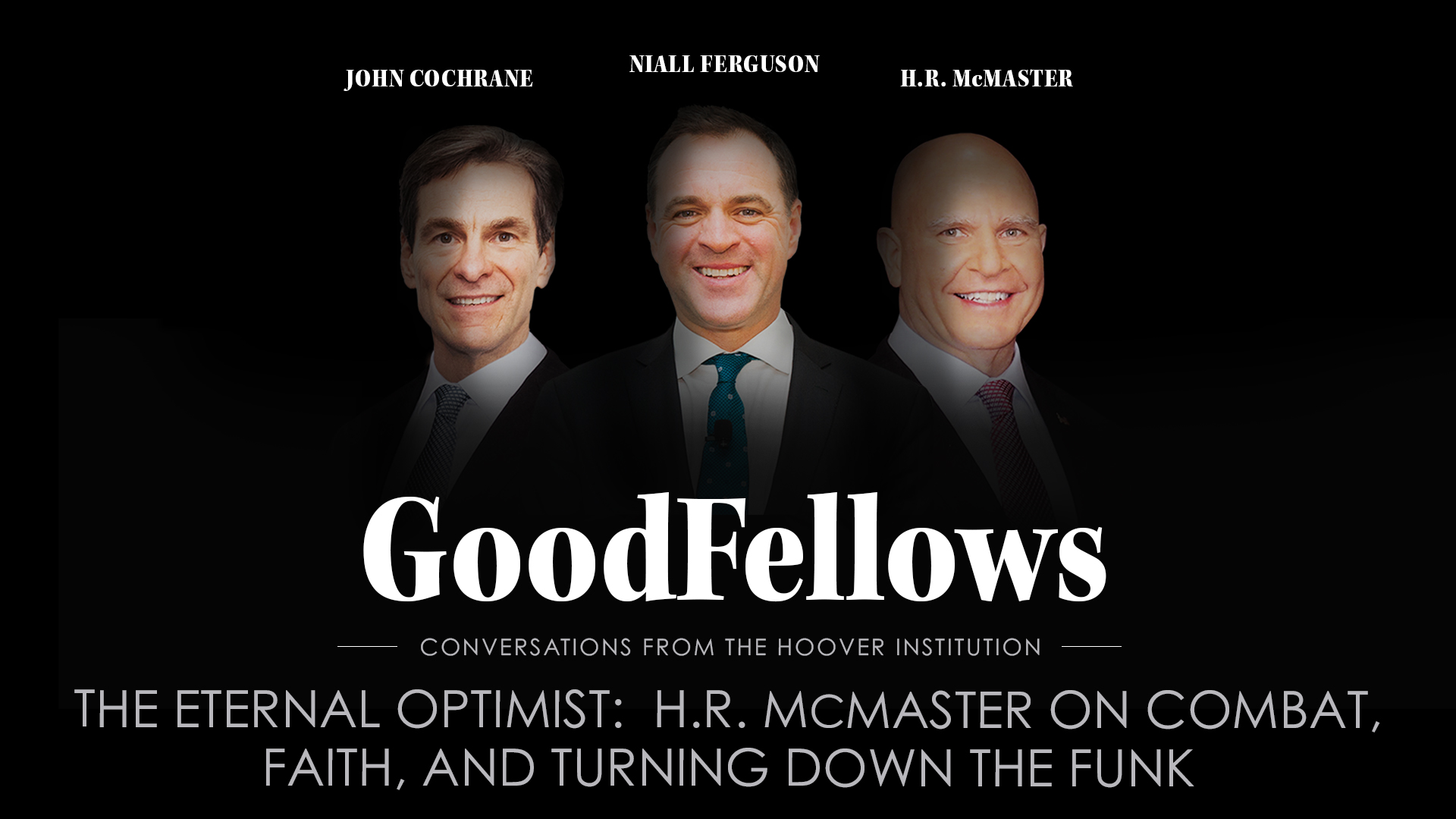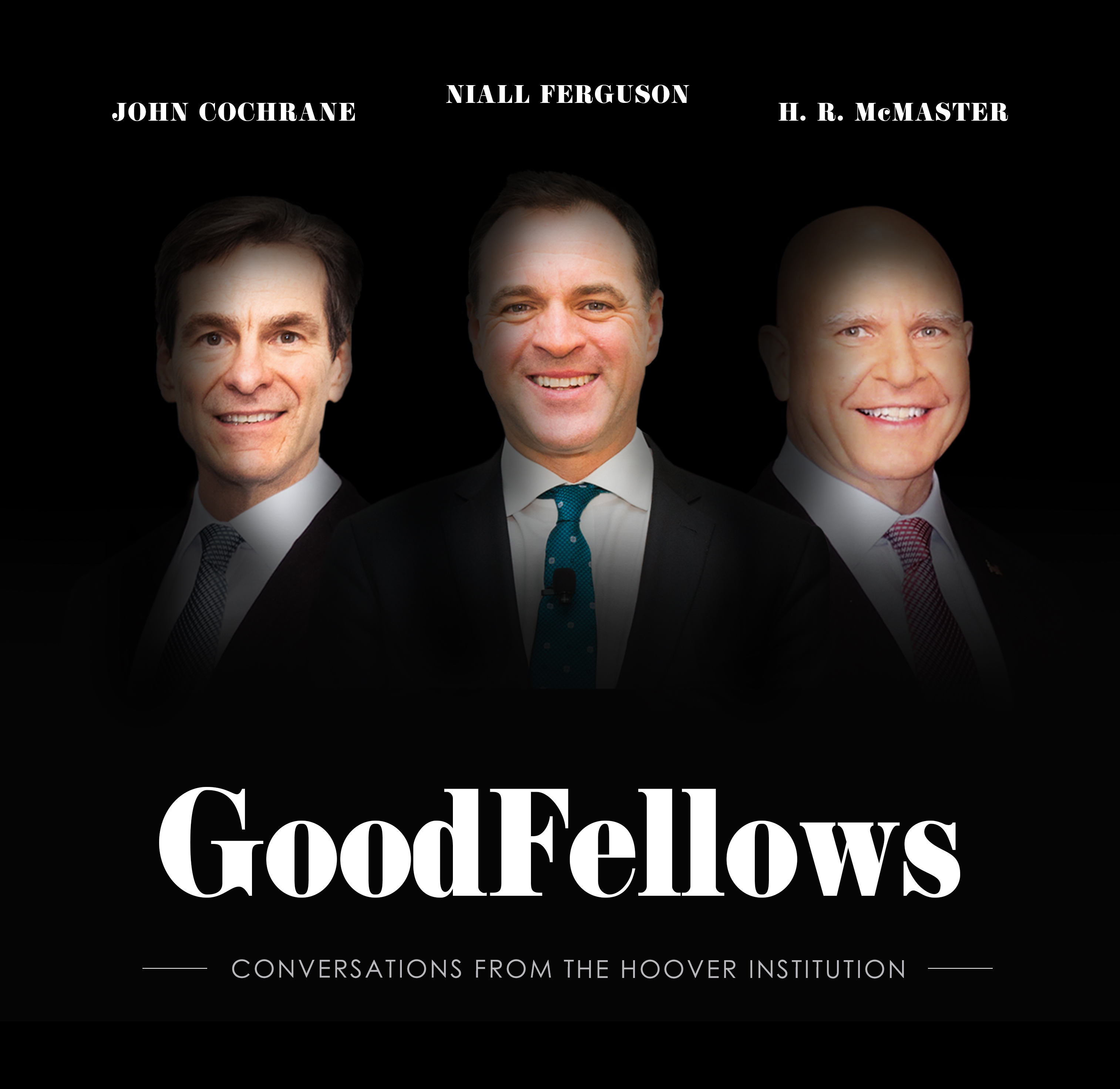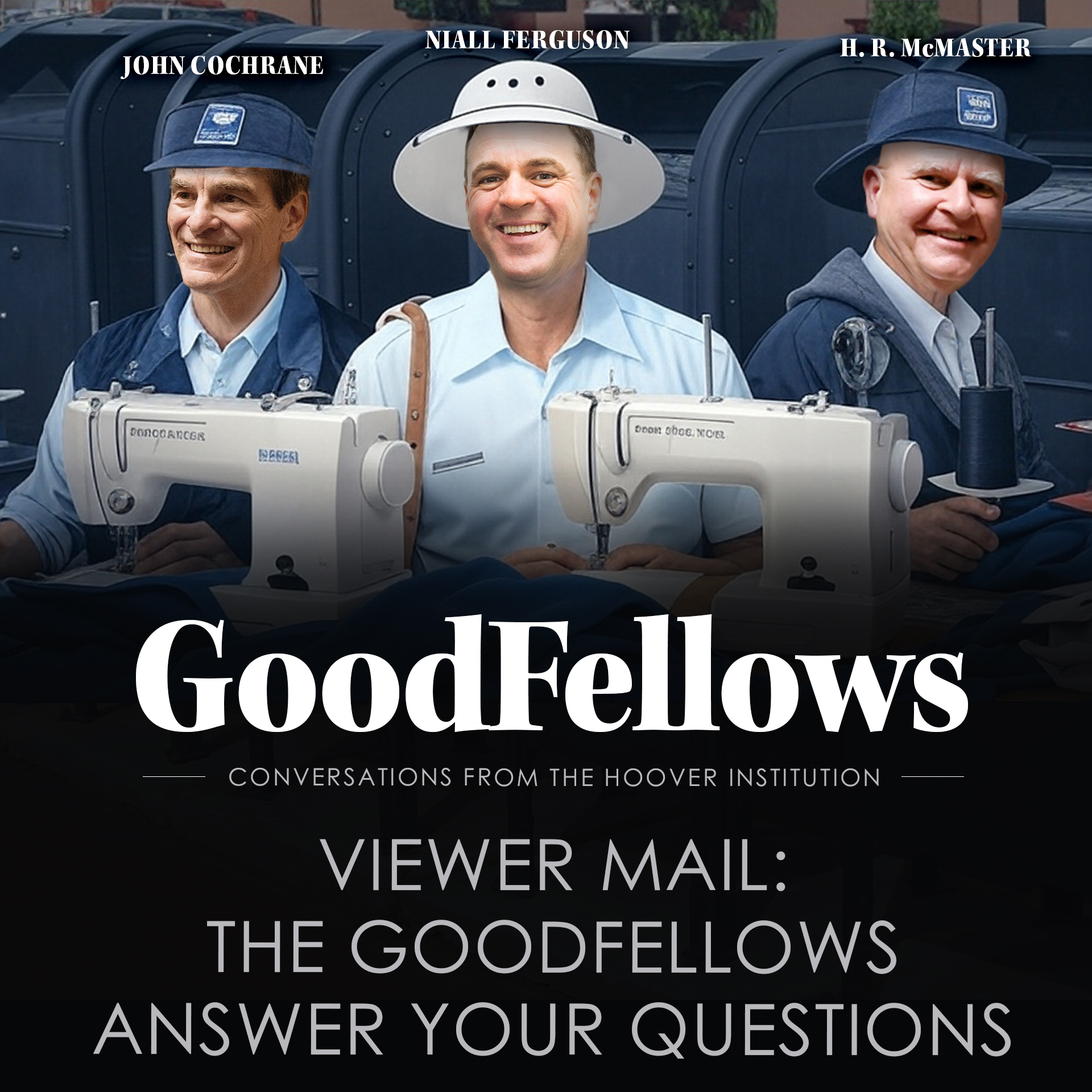In a “solo” installment of GoodFellows, Lt. Gen. H.R. McMaster, Hoover’s Fouad and Michelle Ajami Senior Fellow, a former national security advisor to the president, and a highly honored combat veteran, discusses his childhood in Philadelphia, the inspiring figures he encountered during his Army years, his roundabout journey to becoming an armor officer, lessons from tank battles in the Middle East, and the importance of faith. He also describes a post-service life in California, where, ironically, an Army man makes sense of world affairs while chillaxing on a paddleboard. Also joining the show: Katie McMaster, who recounts how she and her husband met (it was love at first sight), the challenges of being a military spouse, the day H.R. said goodbye to his head of hair (he shaved his head at her insistence), plus her ongoing campaign to spare her Orange County neighbors from the blare of H.R.’s favorite tunes.
>> Bill Whalen: Hi, this is Bill Whalen from Goodfellows. The Hoover Institution is proud to announce two national competitions honoring the life and work of Thomas Sowell, one of the most influential public thinkers of our time. For high school and college students, the Thomas Sowell Essay contest is a chance to engage deeply with his ideas, whether by applying them to a pressing issue in society or by reflecting on how Dr. Sowell's writings have shaped your own worldview.
For creators of all kinds, the Multimedia Creator competition invites bold, thoughtful storytelling in video form no longer than three minutes, responding to a simple but powerful question. What lesson or teaching for Thomas Sowell do Americans most need to learn or remember today? Each winner will receive $5,000 plus a paid trip to the Hoover Institution here at Stanford University for a special celebration in Dr. Sowell's honor.
Details and submission links are available at the following URL, hoover.org/thomas-sowell-legacy. Let me repeat that, hoover.org/thomas-sowell-legacy. We hope to see you here at Hoover in the near future. Welcome back to Goodfellows, a Hoover Institution broadcast examining social, economic, political and geopolitical concerns. I'm Bill Whalen. I'm a Distinguished Policy Fellow here at the Hoover Institution.
I'll be your moderator today. This is a point where I usually introduce at least two or three of my colleagues, but today it's just one good fellow joining us, and that is Lieutenant-General H.R. McMaster. In case you're meeting the lieutenant general for the first time, a few things to know about him.
He is the Fawad Michel Ajahi Senior Fellow here at the Hoover Institution. He is of course, a former presidential National Security Advisor. He is a best-selling author. As I look over my bookcase, I have two of his most recent books. One is called Out War with Ourselves. This is about his one-year tour of duty in the first Trump White House.
Before that, he wrote the excellent book Battlegrounds, which is also the title of a video series he does for the Hoover Institution, interviewing world leaders. What else to say about Lt. Gen. H.R. McMaster? Devoted about 35 years of public service to his country and if you follow Goodfellows, he is our resident and veteran optimist.
H.R., it's great to see you.
>> H.R. McMaster: Hey Bill, great to be with you.
>> Bill Whalen: So in quasi Japanese fashion, H.R. I thought we'd start the show with a exchange of gifts or at least one gift for you, my friend. Would you like to open it up and take a look at it?
Because I think a part of you.
>> H.R. McMaster: Very thoughtful of you. I love it. Go Go Eagles. And. And there's a cheesesteak on there, no doubt, from Della Sandros. The best, the best cheesesteak in Philadelphia. Thank you. Thank you so much, man.
>> Bill Whalen: It's a great gift because General McMaster lives and dies by his beloved Philadelphia Eagles, football season is about to start.
And as his wife will attest when she joins us latest on the show, it's kind of a pair of socks you can wear once before she either throws them away or puts them in the back. But cheese steaks and eagles, Phil, what is it about cheesesteaks that is so Philadelphia, HR?
>> H.R. McMaster: HR hey, it's just, it's a great sandwich, you know, I mean, and, and, and it is, it is very Philadelphia. I mean, I, I don't know what it is about it, but, you know, people talk about like Genos and Pats, you know, they're across from each other.
And there's a whole ritual on how you order at Pats in particular, you have to say cheese with or cheese without. And then with is with onions, without is without onions, or plain with and plain without. And if you don't order that way, you have to go to the back of the line, you know, so.
But at Dalessandro's in my neighborhood, the Roxboro neighborhood, the line is always around the corner. I mean, it's so good and it's been so good for, you know, for generations.
>> Bill Whalen: You know, back in 2004, HR was also the beginning of the end of John Kerry's presidential campaign.
They were taking him around the upper Pennsylvania and Ohio and Michigan trying to make him look like a regular gu. So he goes to one of the cheesesteak places and he gets in line and comes to order. He asks for one with Swiss cheese. The whole place just comes to a stop and looks at him at that point.
>> H.R. McMaster: Too funny. Too funny.
>> Bill Whalen: So this is our third solo Goodfellows HR and in the past two with John Cochran and Sir Neil Ferguson. I made it a point to ask them how they came about, what they do now, how John became an economist, how Neil became a, a very renowned historian.
And in their cases, it's the same story as HR because it's kind of roundabout juries. John went to MIT and at first didn't want to become an economist. He kind of gravitated into it. Neil comes from a family of scientists, so history was something he discovered when he got into uni, as they say in the UK but in your case, your story is different here.
I refer to your excellent substack called history. We don't know. And a post that you wrote about Chuck Bednarik, who, for those not familiar with Philadelphia sports, is a Philadelphia legend. He was an iron man of the Eagles and a boyhood idol of HRS. And you wrote this on the occasion of his 100th birthday.
Let me read this back to you. Bernard pulled his Eagles championship and NFL hall of Fame rings off, fingers mangled by multiple breaks, and pass them over to me. Go ahead, try them on. He said they, of course, did not fit. He asked me what I wanted to do in life.
I told him that I wanted to go to West Point and serve as an officer in the U.S. army. He said something like, you can accomplish whatever you want to accomplish if you put your mind to it. Now, HR my sister's oldest grandson just celebrated his 9th birthday.
He wants to be an NFL player. He wants to be a baseball player. He's in nine year old la la land. But here you are. You were nine years old, I think, when this happened, but you had kind of your path planned out. So how did this happen so early in life?
>> H.R. McMaster: Yeah, I just, I always wanted to lead soldiers in, in the army. I wanted to be part of something bigger than myself and, and to be responsible for building teams committed to an important mission, you know, and, and I was just always drawn to it. I mean, my earliest memories were, you know, playing army with my friends, you know, and, and organizing them into a squad and, and, and I just always wanted to do it.
And I, I think it had a lot to do with my mom who, who, who sort of was just was a tremendous teacher and who got me interested in history. And I read a lot of, you know, a lot of the youth biographies, you know, about military biographies and adventurers and so forth.
And Frontiersman, one of my favorites, still one of my favorites today. And I recommended his biography, the adult biography, Don Higginbotham's biography. And there's another also excellent biography of Daniel Morgan and American Frontiersman, I think was the subtitle of the youth biography that I read. And I just was always drawn to military service.
>> Bill Whalen: So, HR you graduate from West Point in 1984. Tell us about four years at West Point and how your love for history is incorporated into the other studies. Because you just can't go to West Point and major in history and just do a liberal arts education, right?
>> H.R. McMaster: Well, you can now. You have to take a very strong core curriculum that exposed you to all sorts of other other disciplines and courses. But you couldn't major when I was there. You had you could have a concentration, but everybody got a bachelor of science in engineering, whether you wanted one or not.
But I did take as many history courses as I could. I took a great diplomatic history course from one of my old rugby coaches who became, you know, became one of my. One of my mentors. And, and this was then, you know, Major Betson, who, you know, who then retires as a colonel.
Fantastic person and was my sponsor, my first sponsor at West Point, who then left after two years. And so, then Major Betson was my sponsor, was Cole Kingseed. I just had dinner with him at West Point, got to reconnect with him. He taught the world history course. And then taught in the history department as a permanent professor when I came back as a member of the rotating faculty, as a captain and a major teaching history there.
But how can you not absorb the history of West Point? It's so connected to the founding of our nation, to the revolution. And then of course all the artifacts that are there and there used to be this, this, this poster that you would see it down in the history department area said, you know, much of the history we teach was, was made by the people we taught.
You know it would have, it would have you know, MacArthur and Eisenhower patent and so forth on it. But yeah, so I was always interested in history. My, my concentration was international relations, but I took a lot of, a lot of history courses.
>> Bill Whalen: So you mentioned some mentors while you were at the point.
Tell us a few mentors during your climb through the ranks.
>> H.R. McMaster: Well, I've got to mention my first battalion commander, Billy J. McGowan. I wrote a little bit about him a few years ago and, and, and he was an extraordinary person. He was from a sharecropper family, was, was drawn to service himself, came into our army and as an armor officer served with distinction in, in, in, in Vietnam.
And he was just a charismatic leader, larger than life person and he really cared a lot about junior officers. You know, so you'd be you know, on a tank range or something and then you just feel this big hand come over your shoulder. And it was, it was, it was Colonel McGowan, you know, how are you doing Lieutenant?
You know, and, and, and he gave me, you know, he gave me some, some strange jobs for, for a brand new second lieutenant. He allowed me to be the support platoon leader. I'll tell you Bill, I didn't know what a support platoon was. You know, it's, it's of course critical to the battalions mission because it's all the fuel and ammunition and so forth and, and I was ready to be a tackle too.
I'm like what is this support? It was the best, it was the best leadership experience I could have had as a new second lieutenant. Got to know the whole battalion and then, and then, and then went on to a series of other jobs there. But he was one of my first, you know, key mentors and another, you know, was a guy named Tom Dials who was the, he was the division cavalry squadron commander and, and, and he ran a division wide scout competitions when I was a scout platoon leader.
And I had these great sergeants, you know, which is the key to success in the military. A lot of your mentors really are your sergeants. And in this case, you know, I had, I had a great platoon sergeant named Ed Romo and I had a scout section sergeant named Joe Zettlemoyer who was just fantastic.
He was my senior scout. And so we Won that division. Competition like first, second, third sections were all 166 armor. And so Tom Dials, the commander, he said, I want you to come to reforger with us, the return of forces to Germany. Big maneuver exercise in Germany. So he, he, he brings my platoon over there.
I think he also grabbed me because I'm a rugby player and they were going to play a rugby match over there. So he's looking for a few ringers to bring in. And, and then, and then he gave us these great missions. So I got really excited. I was always excited about the army.
But, you know, I told Katie, my wife, when we got married, I said, hey, I think I'm gonna get out after five years. You know, I want to do my, I want to do my duty for five years, and then maybe I'll go to law school and that sort of thing.
I came back from that reforger exercise. I went to a right arm night at the, at the officers club with my sergeants, and they said, what the hell are you doing getting out of the arm? I mean, you, you love this stuff, right? You should, you should stay in.
So I went home that night and said to Katie, how about standing? She's like, fine, that sounds good to me. So I returned my ticket that I got to fly to Chicago. I think I was gonna interview for Procter and Gamble or a big company or something like that.
I bought a suit, Bill. I bought a suit and everything, but I didn't want to not need it for a while.
>> Bill Whalen: That's funny. I looked up your various awards and commendations, HR, my God, it's like the opening scene in Patton where they go down his uniformity to show everything.
By my count, and you can correct me if you'd like, I count at least 12 military decorations. Nine service med medals, plus a handful of badges, patches, and foreign decorations. That's just a lot of hard work. Congratulations. It's my question, ghr, if you were to have one of your grandchildren sit in your lap and show them one of your medals or commendations and use that as kind of a window to what grandpa did for his country, which medal would you pick?
>> H.R. McMaster: Well, you know, of course, when, when you're awarded these things, you think that you're not deserving because, you know, there are individual awards, but, but it's always a collective effort in the army, you know, so. So if I were to point to award, it wouldn't be because I received it.
It would because it would allow me to tell a story about some fantastic and courageous, extremely dedicated soldiers that I got to serve with. And so maybe the one I would select was the one from Desert Storm and tell the story about the Battle of 73 Easting and how our cavalry troop really achieved a lopsided victory against a numerically superior enemy because of, of the way we fought together as a team, and how we, we were bound together by mutual trust, common purpose, but really affection, Bill.
I mean that, that cavalry troop, as any good, really good military unit, it takes on the qualities of a family and, and what allows you to be courageous in battle. And I think this was the case with our, our troop, I know this was the case with our troop is you're more fearful of letting your fellow soldier down than you are of any enemy bullet.
So it's kind of that sense of honor and the willingness to take risks and sacrifice for one another.
>> Bill Whalen: So you would show them your Silver Star?
>> H.R. McMaster: That would be it, yeah, that would be it.
>> Bill Whalen: Tell us a bit about what it's like to go into battle and then recover from battle.
Thanks to Hollywood, we have all these impressions about what it's like to prepare for war. Sad scenes of men signing insurance forms if they're going to storm the beaches of Normandy, people writing letters to their loved ones, things to that effect. But how do you prepare going into battle knowing that the next day might be your last day?
>> H.R. McMaster: Well, I, I think part of it is you prepare your whole career for it. I mean, I, I wanted to, I begged my parents to go to a military high school because I wanted to be in the, in the military, then went to West Point. So I felt like I was preparing myself for that moment.
You always ask that question, right? I think, you know, young men and women who come in the army, how I react, you know, will I have what it takes? You know, that kind of a, you know, thinking about war. Because you read about it from a historical perspective and other people's experiences and learn about it that way as well.
So I read a lot of first hand accounts of combat, leadership in combat. James McDonough's platoon leader is fantastic by, by the way, for Vietnam, Charles B. McDonald's book on company commander about his World War II experience. And so I try to prepare myself by learning from the experiences of others.
And then when you say goodbye to your family, I mean, I just don't dwell in the negative. I mean, and I think my family's like that too. I mean it's not productive, I think, to engage in sort of, you know, what could happen, for example. And I think in combat, it's important for you to realize, hey, not every bullet's got your name on it, so hopefully you'll be fortunate.
As, as Churchill said, there is nothing more exhilarating than to be f shot at without effect. And I've found that to be the case. And really what happens in battle, you know, and in terms of preparation for it, you should know that you're going to do your duty.
I mean, I think, as for the reason I mentioned already, which is you don't want to let your fellow troopers down, but also, as a leader, you're kind of insulated from fear, Bill. I can't remember, I don't recall feeling fear in combat. And I think, I think that's because I was preoccupied with ensuring that I made the right decisions, made timely decisions to ensure that that art our troopers had the best chance to overmatch the enemy and to come out of combat actions without suffering casualties.
>> Bill Whalen: How important is the role of faith in all of this?
>> H.R. McMaster: It's extremely important, Bill. There's the old saying, There's no atheist foxholes. Hey, I think that is truly the case and Bill, I have to tell you, there are things that I can't explain that have happened to me in combat, honestly.
And I think it's divine providence, I mean, maybe others could come up with an explanation, but there are certain things I just cannot explain. I roll rolling down a street in Tafa or Baghdad and feeling like a tap on my shoulder or something and it's saying, stop, driver stop, scan the area and then seeing a roadside bomb.
Just getting that instant feeling in Desert Storm and I don't think I've ever told the story publicly like this or on a show that has the distribution thankfully to our listeners and watchers, the Goodfellas has. But before Desert Storm, I was going to replace one of my sergeants as a platoon sergeant, this was a great sergeant, great non commissioned officer, name is Dean Torian.
We stay in contact all the time, we call each other every Christmas Eve and he just wasn't ready to be a platoon sergeant in my view. He's a great scout squad leader, and so I said, hey, Sergeant Rana, I think I'm going to replace you here, but I want to give you an option.
Do you want to stay in the troop or do you want to transfer to another cavalry troop and get a fresh start? He said, well, let me pray about it, I was kind of skeptical, Bill, I'm like just tell me what you think, what your preference is? And so he came back the next day and he said, hey, sir, I prayed about it, now, we had not yet been alerted to Desert Storm yet.
Our cavalry troop had not been, our regiment had not been and he said, I prayed and three things came to me. He said, the first is that I should stay in the troop, the second is that we are going to go to war and you will make the right decision at the right time and as a result we will all come back alive.
And he said the third thing is a verse of the Bible and he cited the verse of the Bible and he said he will make seeing eyes blind and blind eyes see. And then if you fast forward from that, this was in the fall of 1990 to February 26th, 1991, the day of the battle of 73 Easting.
It had rained all night, it was fog in the morning, then it was blowing sand, high winds, all of our helicopters were grounded, visibility was very limited. You couldn't see very far at all because of the sandstorm, and then when we first made contact with the enemy, we then assaulted.
We began to advance further to the east, and my tank came over this imperceptible rise. And I'm telling you, Bill, it's like the curtain lifted, sandstorm ended and the wind, our soldiers remember the wind having been in our face. You're blowing the sound of our initial engagements away from the enemy, maybe giving us more of an element of surprise, but then the wind was at our backs after we crested this rise.
And so the next day, this February 27, Dean Torian came up to me in the desert in Iraq, and he said, hey, I'm not going to tell you what I told you in Bamberg, Germany, which is where we were before we deployed. He said, I want you to tell me and I just got goosebumps, I could give you tons of examples of this.
And then also, I think it's important when you're considering the war, going into battle, which is an activity that involves killing and the prospect of death. That you consider the spiritual dimension of readiness and the moral and ethical dimension of preparation for combat. Talk to your soldiers about why the war is just, in this case, evicting Iraq from Kuwait and giving Kuwait back to the Kuwaitis.
Ending the brutalization of the Kuwaiti people and the looting of that country, because soldiers had these questions in mind, and I would go to every service. I'm Catholic, but I went to the Catholic service, the Protestant service, and the Jewish service and so I could be there with all my soldiers.
The first, it's important they know maybe their commander's not a heathen, maybe that gives them a leg up a little bit and can allay their concerns. But also, it's a great venue to talk to soldiers, and it would be often, after these services, at night, in the middle of your perimeter, in the middle of the desert, with the panoramic view of the stars.
And you're walking back to your tank with one of your soldiers, and your soldier says to you, hey, I'm worried, I'm worried about whether it's the right thing for me to kill enemy soldiers because he was a religious person. And we're walking back from the service and then I would have explained to him about the justness of the war.
And then the same soldier, after we were engaged in occupying southern Iraq after the war, we're in the town of Anazer, we're actually at Abraham's birthplace or of the Chaldees. The same soldier came up to me and he said, and he saw the brutality that Iraq had visited on their own people, right on the Shia population in the south, the mass executions they were conducting in the city near us.
And he said, you're right, it was just a fight, so anyway, sorry to go on about it, but it's a huge part of preparation for combat. And I think because of our tradition of separation church and state and so forth, we don't talk about it enough. And I think it's important to, for commanders to make sure your soldiers have access to religious services, and then of course, Bill, it's really important to honor your dead, it's part of the grieving process.
Grief work is a command responsibility, just like prepare any other form of preparation for combat and being responsible for the mental, psychological, spiritual health of your troopers.
>> Bill Whalen: One thing our viewers may not know about you, HR when we introduce you as a presidential National Security Advisor, that means that you're in charge of the National Security Council on the White House.
That's put you in very elite historical company, our boss, Condoleezza Rice, Colin Powell, Henry Kissinger and so forth. But you were doing this while you were on active duty, which is a rarity in Washington because Congress always wants to draw very fine lines between military active and military retired.
But you could have cycled back into the army after a year in the White House and gone for a Fort Star, so why didn't you go for the fourth?
>> H.R. McMaster: When I got the call to interview for the job as National Security Advisor, I was planning to put in my request for retirement.
It seemed clear to me at the time there wasn't a four star job for me in the army or in the Joint Force at that point. And when the call came out of the blue to interview for the job as National Security Advisor, I decided at that moment that I would retire out of that job.
I didn't want to even give the impression that I took the job to get a fourth star, and so I stuck to that. I was offered an opportunity to compete for various four star jobs while I was in the job as National Security Advisor. I would hope that that was based on merit, but maybe it was some people want to get me out of that job, too, that was that maybe that dynamic.
But I said, no, thanks, I appreciate it, I'm going to do this job as long as I can, as long as I'm effective for President Trump. And when I'm done, I'm at peace with that and I'll retire from the army right now.
>> Bill Whalen: Our viewers should know that the reason why you were just absolutely overdressed for this, I might point out, is you were just giving a speech over at the Hoover Institution's Boot Camp.
This is something we do every summer, we bring in college age kids and we call it a Policy Boot Camp. And they hear from you and other Hoover figures and kind of just get a taste of what it's like to be Hoover fellow and hopefully spark their intellectual curiosity.
I went over to see you speak and then I was eavesdropping on some kids having lunch afterwards and they said two things. Number one, what a great speech, and then number two, they were kinda curious as to your politics, they couldn't quite figure out where you were on the spectrum.
So let me now ask the question I'd look for you to artfully dodge, which is really, what is your worldview? HR we always want to be people in the categories of left, right, center, conservative, libertarian. Where do you fall?
>> H.R. McMaster: Well, you know, I think that I would say that from a foreign policy perspective, that I am what I would call an internationalist.
The people who are sort of part of the neo-isolationist movement would call me a globalist, which is not the case. I believe in prioritizing American interests, but I believe that the way to achieve the best outcomes for Americans is through international cooperation, multinational cooperation. I also believe in remaining engaged internationally because problems or challenges to our security and our prosperity that develop abroad can only be dealt with at an exorbitant cost once they reach our shores.
I believe that America cannot solve the world's problems. We can't conciliate the furies of the Middle east, but we can catalyze. We can catalyze positive change by supporting those who share our principles and share our worldview, recognize the benefits of representative government and rule of law and fundamental rights as those that are in the UN Charter, but are really the basic rights of freedom of speech and religion and assembly and so forth and due process of law.
And so, I mean, that's kind of my approach to it these days, Bill. You know, everything's become so partisan and vitriolic. I try to transcend it, I don't know if I'm succeeding, I hope I am. But, you know, I'd never been a political person in terms of partisan politics.
I mean, I recognize that war is an extension of politics, it's a political competition. There are political competitions we engage in. So you can't, you can't forswear politics. But I think in terms of partisan politics, it's gone too far. Like, I, you know, Bill, I never voted. You know, I, I followed the, the example of George Marshall in an effort to keep that kind of bold line in place between partisan politics and our military.
I've noticed with some dismay that, that, that both leaders in both political parties, not all of them, some leaders of both political parties, are trying to drag the military, you know, into. Into political, into. Into partisanship, you know, with this narrative, maybe from the far left, that the military is extremist or from the far right, you know, that the military is woke or they're woke generals.
I mean, man, military is not extremist, military is not woke. Keep the military out of, out of, you know, your kind of, you know, your descent into the mud because our institution can't afford it. And it's inimical to combat effectiveness, right? And, and we have to recognize, you know, as senior officers, generals, you know, even retired generals, that, that we owe our best advice.
Right? But, but once we cross the line to advocacy, you risk getting mired in politics. And by the way, for active duty generals, say, nobody elects generals or admirals to make policy, right? It's. It's our civilian bosses that do that, who do that.
>> Bill Whalen: So if we could put Second Lieutenant McMaster on this Zoom call and I'd get out of the way, and retired General McMaster could talk to Second Lieutenant McMaster after you explained to him what the heck the Internet and Zoom are, what would you tell that young man coming out of West Point?
>> H.R. McMaster: Yeah, I would, I would tell, you know, what I figured out, I guess, over, over the years, which is don't worry about getting your preferred assignment, your preferred whatever and, you know, job. This would be for anybody, because if you, if you apply yourself and do your best, do the best job you can for your soldiers, for your mission, that everything will work out.
So. Bill, you know, I always knew I wanted to be in the Army. As I mentioned, I thought it was going to be out for five years, it didn't work out that way. You know, Katie, my, at my retirement kind of party, gave this Rose speech, and she said, thank you for the bonus, 29 years, you know, and, but then, you know, I, I wanted to be commissioned in aviation.
You know, I had read a great, great book called Chicken Hawk about, about Aero scouts in Vietnam. I thought, man, I wanna do that, I wanna be an aero scout. And so I was commissioned in aviation and, and, and so I was getting what I wanted. But aviation had just become a branch again in the army ever since that Sad Day in 1947 when the, when the Army Air Corps became the Air Force, you know, and, and, and so, you know, I was on my way to Fort Rucker, Alabama.
But first I had to go to basic course, cuz the branch was not stood up yet at Fort Knox, Kentucky. So I'm an armor basic course, the last M60 A3 tank only course, right? No Abrams in there. And, and, you know, you know, tanks were fine, but I wasn't really into them that much at the time.
And they find astigmatism, my eye disqualify me from flight school. They're like, hey, you're an armor officer now. I called up and I said, hey, this is Second Lieutenant McMaster, you know, which always gets a warm reception at what they call Human Resources Command now. I say, I'd rather be an infantry officer.
That was my second choice. Can I go to Fort Benning? So they said, no, Lieutenant, it's not cost effective, you're an armor officer now. And so I said, well, then in that case, I'd like to give you my preferred assignment because I'd like to go to Germany. And they said, hey, Lieutenant, thank you for that preference.
Fort Hood, Texas it is. And so nothing worked out. I went to Ranger school and then went to. Then went to, As I mentioned, 166 armor, the Iron Knights of the 2nd Armored Division, the Hell on Wheels Division, General Patton's old division, and then General Ernest Harmonies. Talk about a kickass commander, Ernest Harmon in In World War II.
And a great combined arms unit in the 2nd Armored Division. Sadly, now, no, those colors are retired now of the second Armor Division. But I get there, I get this support platoon, that wasn't my preference. So all these assignments, I mean, they never worked out. I went to the 2nd Cav Regiment in Germany.
I'm like, okay, Border cavalry, Cavalry troop. I can't wait to get to a cavalry troop. I wound up regimental headquarters, you know, as the force modernization officer. I'm like, what is this? You know, I'm not even, you know, doing anything operational. I went to see the. The regimental commander and.
And I said, hey, there's nothing I'd rather do than command a cavalry troop in this regiment, but I'd rather command a shower and bath unit than do what I'm doing right now. And he said, all right, McMaster, you know, you'll have a new job, you know, next week, I'll reassign you as a plans officer.
Get the hell out of my office. So I think you can advocate for yourself, but really have confidence that things will work out. And I get these odd jobs in the Army, Bill, that were really great opportunities to learn, to grow, to build teams not only within the military, but multinational and civilian military teams and so forth.
So, hey, I would just say what I would tell myself as a young me, I would say, hey, don't worry about it, it's going to work out.
>> Bill Whalen: Okay, so, HR, I'd like to now spring on you the Herbert Hoover questionnaire. You ready?
>> H.R. McMaster: Yep, I'm ready. I'M ready.
>> Bill Whalen: Okay, question number one, hr. What is the best sandwich? This would be the non cheesesteak category
>> H.R. McMaster: Well, I mean, of course, cheese steak category's still a sandwich, cheese steak. But I would say Dinic's. Dinic's, which you can get at Reading Terminal in Philadelphia. Get the pork sandwich with broccoli, rabe, and provolone.
I'm telling you, it's killer. Best sandwich in the world.
>> Bill Whalen: What is the scariest animal?
>> H.R. McMaster: The scariest animal? I kind of. Anyhow, I grew up in Philadelphia. I mean, I'm afraid of animals. So, I mean, bear, lion, I mean, I don't I don't like any of them, you know, I'm a city guy.
If I'm armed, I'm not afraid of him. But, you know, if I was, like, in the wilderness, maybe. I guess. Crocodile. Crocodile is pretty scary.
>> Bill Whalen: That'd be my vote, too. Who's your hero of fiction?
>> H.R. McMaster: Hero of fiction. Okay. Well, I mean, Sam Damon in Once an Eagle.
How about that? How about your favorite character, though, in fiction would have to be Flashman. And if anybody hasn't read the Flashman series, you gotta read. I mean, you'll cry, you'll just cry if you're laughing so hard.
>> Bill Whalen: Favorite action movie?
>> H.R. McMaster: Gosh. Favorite action movie? Well, you know, war movies, maybe.
Does that include it? Maybe A Bridge Too Far. Bridge too far.
>> We, my friends, are the cavalry on the way to the rescue. A bridge too far.
>> Bill Whalen: Okay. Apples or oranges?
>> H.R. McMaster: Apples.
>> Bill Whalen: Apples. Why?
>> H.R. McMaster: Well, because I just. I like them better. They're, you know, I like to.
Sometimes if you're, you know, with a little bit of peanut butter, as a snack. It's a healthy snack, a little bit of protein, it's good.
>> Bill Whalen: Fair enough. Which talent that you currently do not possess that you most like?
>> H.R. McMaster: I'd love to play musical instrument. I'd love to be like Neil.
Maybe play the bass and just kind of chill in the back of a band playing the bass, you know, or maybe, you know, if I could, you know, for. Maybe play. If I could just learn maybe how to play flashlight on the bass. Maybe just do that. That'd be great.
>> Bill Whalen: A little pork pie hat, maybe. Okay. All right, you're an army man, but you spend a lot of time in the air. HR Window or aisle?
>> H.R. McMaster: Aisle for sure.
>> Bill Whalen: Why?
>> H.R. McMaster: Because I. I gotta wander around just a little bit. I just can't. I can't sit for that long.
>> Bill Whalen: Can't say for that long. What's the longest flight you've ever taken, Australia?
>> H.R. McMaster: Well, yeah, probably to Australia or to Japan or. You know, I used to go to. To the Middle east from, you know, from everywhere. Dubai, those 14. Anything more than 14 hours is rough.
>> Bill Whalen: I can imagine. You're talking military aircraft?
>> H.R. McMaster: Yeah, I've flown a lot on military aircraft. And the key to that is if you're on a C17, you got to get a space on the floor. Comfortable spot on the floor early.
>> Bill Whalen: I was gonna ask, cuz there's no flatbed seats, right?
>> H.R. McMaster: No, no. But the floor of a C17 is surprisingly comfortable.
>> Bill Whalen: Favorite smell or favorite aroma?
>> H.R. McMaster: Gosh. Gunpowder.
>> Bill Whalen: Not the smell of napalm in the morning.
>> H.R. McMaster: No, I mean the smell of your tank after. You know, after. After a series of engagements. It's just.
I miss it. I miss it.
>> Bill Whalen: The most used app on your phone.
>> H.R. McMaster: Most used app on my phone. Let me think. I guess, you know, maybe. Probably. Navigation app. Yeah, probably. Navigation app.
>> Bill Whalen: Okay.
>> H.R. McMaster: I'm getting. I'm losing my scouting ability because I'm over relying on technology.
>> Bill Whalen: Cats or dogs?
>> H.R. McMaster: Dogs.
>> Bill Whalen: Dogs. Why?
>> H.R. McMaster: Well, obviously we've always had dogs. And I'm allergic to cats.
>> Bill Whalen: This is going to be a tough one. You might need a minute to think this one over. You only get one song to listen to for the rest of your life.
HR what is it?
>> H.R. McMaster: Wow. Wow. One song. What could it be? Geez.
>> Bill Whalen: I know it's tough because I know you have a lot of favorite artists, but one track?
>> H.R. McMaster: Yeah, yeah, one track.
>> Bill Whalen: Gosh, kind of sounds hellish when you think about it.
>> H.R. McMaster: It's like impossible to say.
Right? I mean, and so let me think. What would it be? I would say-
>> Bill Whalen: Well, let's take this a different direction. Let's say HR McMaster is a professional baseball player. You're playing for the Phillies. What is your walk up song?
>> H.R. McMaster: Okay, walk up song, man. Well, I think more of rugby, what I used to listen to to get ready for rugby matches, you know, how about.
How about Thoroughgood, Bad to the Bone or. Or. Or Nazareth, you know, Hair of the dog, you know, or. Yeah, one of those. One of those real. One of the ones to get you fired up.
>> Bill Whalen: Final question, HR Describe the rest of your life in five words.
>> H.R. McMaster: Okay, five words. I. I hope learning. Loving. Gosh, you know, respecting, you know, other people's opinions and so forth. Enjoying and friendship. Comradeship.
>> Bill Whalen: Yeah, we should expand that to 10. Because you could have said family. You could have said intellectual pursuit. There are a lot of ways to play that.
>> H.R. McMaster: Yeah, absolutely, that's why I was thinking of what I was saying. Loving. Taking advantage of being with those who you love. Maxing it out.
>> Bill Whalen: Okay. Well done. I hope that wasn't too painful for you.
>> H.R. McMaster: No, I mean, I really don't like talking about the personal stuff, but hey, it was fun.
It was fun and the other guys did it, so I had to do it.
>> Bill Whalen: HRE should know that one of the biggest demands we have from our viewers is to have wives on the show. And so Mrs. Cochran agreed to do the show, and so did lovely Mrs. Ferguson.
And it's now my honor to bring in to Goodfellows, making her debut, the lonely Katie McMaster. Hello, Katie.
>> Speaker 3: Hey, Bill.
>> Bill Whalen: So it's our chance to now drop a lot of dimes on hr. So where shall we start?
>> Speaker 3: Well, where should we start?
>> Bill Whalen: Let's start with him promising five years in the military and then giving you an extra 29.
>> Speaker 3: Okay, so I met HR when we were out with some friends, and I knew a little bit about the military, but not really. And I was very intrigued with West Point because I thought, my gosh, those houses are gorgeous. They're great. And then I went to visit HR at West Point, and I'm thinking to myself, yeah, I could live like this.
And HR said, you know, if we get married, we're never going to live in a house like this because I'm getting out in five years. And so I'm like, okay, good, that's fair. We're getting out. I thought for sure I'd get him back to Orange County. He was going to maybe go to law school.
He bought a suit and everything. And then he went to a right arm night. And his first sergeant. Or maybe was it your first sergeant, HR?
>> H.R. McMaster: It was my old first sergeant, motor sergeant and scout, platoon sergeant, Ed Romo and Joe Zettlemoyer are those guys. Sergeant Gonzalez, all those guys.
>> Speaker 3: So they said, you got to stay in. So he comes home and he goes, well, you know, maybe I need to stay in. I'm like, okay, let's stay in. So I got. How many more extra years than the promised 5?
>> H.R. McMaster: 29.
>> Speaker 3: 29 extra years. Thank you.
>> Bill Whalen: Love at first sight. Yes, HR you better say yes.
>> H.R. McMaster: Absolutely. Absolutely.
>> Bill Whalen: Okay, now the question.
>> Speaker 3: In the way home, in the car, I told everyone I was gonna marry him.
>> Bill Whalen: Whoa.
>> H.R. McMaster: And I'll tell you, the night we met, we're exchanging addresses, like in phone numbers, you know, because you wrote letters back then.
And the hooker on our rugby team, Bill Coyle, he comes up and goes, hey, H, what are you doing? You're never going to see this woman again in your life. Sit it right in front of Katie.
>> Speaker 3: And I'm like, I can hear you.
>> H.R. McMaster: We like to remind him of that.
>> Bill Whalen: Now the question. Katie, a lot of people probably want to know, HR on the shaved head, did he do it on his own? Did he consult you? Did he just spring it on you? How did it happen and when did it happen?
>> Speaker 3: This is a typical HR story.
So HR did not want to wait in line to get his haircut, and he also didn't want to put his head in a bowl like you would at a beauty salon. So it was always crowded at the barber shop. So he said, just, I'm going to get some shavers or what, you know, a razor.
Just do my hair. I'm like, I've never done it before, but clippers, clippers, clippers. But, you know, how hard could it be? And then one night, you know, after maybe a glass of wine, he goes, let's do it. And I'm like, okay, do it. And there kept being divots in another divot.
And I was always correcting the divots. And I said, why don't you just shave your head? And he did. And that's the Hair Club for Men started.
>> Bill Whalen: I love it. Tell us what it's like to be a military spouse, Katie. I know a few spouses who've been army wives, Navy wives, Air Force lives.
But how. How do you prepare for it?
>> Speaker 3: You know, I don't think you really prepare for it. I do think, looking back on my time, it was an absolute honor, privilege. And when you. When you first kind of come in contact with. With military, you're a bit taken back at the camaraderie and the great friendships that you make.
And you pick up and move every two years, but you're always moving into another community where everyone's there. And I think I realize it even more now that we're in a civilian life is I do have great neighbors down in Newport, but you just don't have that neighborly feel like you do in the military.
And everybody's on the same page. All of the spouses are doing the same thing, they're all working together. There's competition normally, because that's human nature, but not really. Not like I don't think it would be in corporate America, because I do think that we were fighting. I'm not fighting, but we're kind of going forward for a common goal.
I think I was most struck by how incredible it was when HR commanded for Benning, when we would see every two weeks a graduation of basic, basic training soldiers. And it just. You get just goose, goosebumps, all these young men and women wanting to serve their country.
>> Bill Whalen: Now, one thing our viewers should know that I love about Mrs. McMaster is that she and I share a love for really bad television.
And I'm not going to call you a Real Housewife of Orange county, but we know the channel and all that. But can you get your husband to watch Bravo? Can you get him to watch trash TV, or does he draw the line?
>> Speaker 3: No, he's very funny. In fact, I have three daughters or we have three daughters, and whenever they fight, he blames it on reality television.
He's convinced that reality television makes you fight with each other because they all always are enraged about something. I don't think you've ever watched reality tv. One time he did walk in on one of our girls watching the Shahs of Sunset, and she knew he was gonna give her a hard time if it was reality television.
So he said, what are you watching? She says, a documentary on Persian Americans. And he goes, okay.
>> Bill Whalen: Well, let's push back with the funk music that he listens to. Everybody has. Everybody has an acquire test. Was HR a good girl?
>> Speaker 3: Dad, he is a great girl.
Dad. He's a really girl's dad. HR has been surrounded by women most of his life. His sister, his mother, his aunts. His father had four aunts. He was always kind of the only guy. And then payback is we have five grandsons.
>> Bill Whalen: I love that. Tell us a bit about your life down in Orange County.
So I find one of the great artists. Here's the man who served his country on land for decades and now he takes to the water.
>> Speaker 3: He does take to the water. And I never thought I'd get HR back to Orange county, to be quite honest. But he's very much embracing the life.
He is always in a rain spooner shorts and flip flops and paddleboard.
>> Bill Whalen: But this is the good life. This is California, the side doesn't get enough attention. We focus on the negatives of California too much. But if you can have a nice home in California, a nice place, there's no better place to be.
But tell us a bit about how you guys are enjoying. I'm not gonna call the golden age because you both are quite busy. But without HR now in the service and being abroad, how do you guys manage your time? How much time do you get with family and how much time do you get with each other?
>> Speaker 3: You know, HR works hard, but we do get a lot of time together. And I think our biggest priority is being with our family, with our girls and our grandchildren, our sons in law. And then we're very fortunate here in Orange County. My family lives very close to.
And HR sister is always visiting. So it's been mostly spending time with family. It's been very nice.
>> Bill Whalen: Do you have any particular favorite Hoover fellows besides your husband?
>> Speaker 3: Do I have something? I love all the Hoover fellows. I love Peter Robinson. I like Neil and the grumpy economist.
I love Victor. I like Bill.
>> Bill Whalen: Thank you.
>> Speaker 3: I like them all, I love the Hoover family.
>> Bill Whalen: Now, what say you to the idea of you and Mrs. Cochran and Mrs. Ferguson taking over Goodfellows and just making it.
>> Speaker 3: You know what? I think that we could do a great job.
>> Bill Whalen: How would you do it?
>> Speaker 3: We have to have another name. Maybe the Housewives of Hoover.
>> Bill Whalen: Real Housewives of Hoover.
>> Speaker 3: Real Housewives of Hoover.
>> Bill Whalen: Why do I get the feeling that would be my last conversation with Condoleezza Rice if I brought that up?
>> H.R. McMaster: None of you are divas.
That's the problem. You're not divas.
>> Speaker 3: We could Play 1 on TV though.
>> Bill Whalen: Okay, HR this is your chance to say a few Kind words about your lovely wife.
>> H.R. McMaster: Okay, so, I mean, best day of my life was meeting Katie when I was a first year or CEO senior at West Point, met through some of my rugby teammates and mutual friends that we had.
And then, you know, Katie signed up for this whole kind of crazy program we've been on for those years in the military. And what Katie didn't say, because she's too modest to say it, is that she was a real anchor for our army communities wherever we went. And she did a fantastic job kind of building a sense of family among family members, whether it was in the platoons that I had the privilege of leading, the cavalry troops that I commanded or squadron or regiment or at Fort Benning.
And Katie is, is a, is a relentlessly positive person. And every time we moved with our daughters, which can be tough, like we're in, I think, our 23rd House or something now that it wasn't about, can you believe we have to move again? She was like, hey, how exciting.
We're going to Germany. We're going to the Mojave Desert, at, at Fort Irwin, California, you know, and, and so that positive attitude was contagious for military families and with our daughters as well. And of course, Katie had to bear the major burdens of parenthood while I was gone for long stretches of time.
I mean, I think, what, five and a half years or so, Katie, between 2003 and2012. But, but really what I'd like to highlight and talk about is, you know, we talked about, Bill, we're mentioning about, like, memorials, services for soldiers and grieving. Katie did an amazing job at, at Fort Carson supporting those who had suffered losses and, and unimaginable losses of their, of their loved one, you know, their husband, their, their father.
And we unfortunately lost 63 soldiers killed in action. When I commended the 3rd Cavalry Regiment for every one of those families that were on base, Katie went, formed a care team. And then after the notification, which occurs when the, the casualty assistance officer, the chaplain, and in this case our rear detachment commander, makes the notification of the soldier's loss and, and, and provide some initial comfort to the family, then that family's left alone.
So what Katie did is with this care team is then, you know, the family would be asked, hey, would you like somebody to come help you with what we have to go through here and what happens next, and making phone calls or whatever they can do to be of assistance.
And Katie met every single one of those of those families, went to every memorial service and was a real rock, you know, for our, for our family members during our combat tour of the 3rd Cab Regiment. So, you know, of course, nobody trains people to do that. There's no, you know, obviously there's, you know, it just depends on the person.
And Katie is an extraordinarily empathetic person and, and, and was a great, a great, you know, comfort to our, to our family members, but also, you know, created, as I mentioned in any every assignment, a real sense of community and a sense of the army family.
>> Bill Whalen: That is very sweet.
HR Final question for the two of you. So I've always thought, Katie, you'd be great to hang out with because you and I could just go down the sewer of reality TV together for a couple of hours. But I've always thought HR would be the perfect guy to go on a road trip with because he's just so full of life and fun and there wouldn't be anything black to talk about, but there would be run problem music.
There's only so much Grateful Dead. I can take George Clinton. How do you handle the music?
>> Speaker 3: Who's the other person, HR that you always have blaring here?
>> H.R. McMaster: Gosh, I love, like Sean Mullins, maybe Sean Mullen. Yes, Sean Mullins is great. I mean, yeah, I mean, I dispatch, you know, I mean, I've got some pretty wide ranging taste, but I could accommodate your taste, I think.
>> Speaker 3: Yeah. He likes rock.
>> H.R. McMaster: Usually, some classic rock is mixed.
>> Bill Whalen: I know the word blaring.
>> Speaker 3: Yeah. Sometimes it is blaring. And I do have to remind him that, you know, we don't have to have the neighbors hear our music.
>> Bill Whalen: I love that. Well, Katie, thanks for coming on Goodfellows.
I hope to see you in the near future either down south or up here at Stanford.
>> Speaker 3: Absolutely, Bill. Thanks so much for having me.
>> Bill Whalen: Okay. And that's it for this solo episode of Goodfellows with Lieutenant General and Katie McMaster. We hope you enjoyed it. We'll be back soon with a new episode of Goodfellows.
Until then, take care. I mentioned General McMaster's books in the beginning of the show. Let me repeat them. They are at war with ourselves. That's his year of the Trump White House and Battlegrounds. And of course, go to the Hoover Institution and subscribe to his excellent battleground interviews and his Substack history.
We know, on behalf of the Hoover Institution, Lt.-Gen. H.R. McMaster, all my colleagues here, we hope you enjoyed the show. Till next time, take care. Thanks again for watching.







